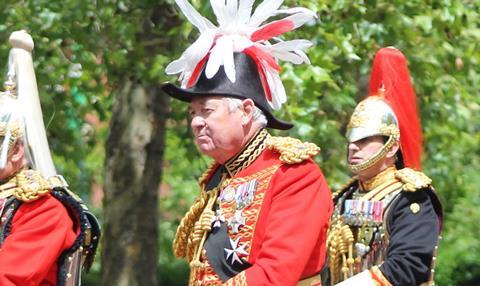One of the biggest names synonymous with the meat Industry, Lord Vestey, has died aged 79. He would have celebrated his 80th birthday this coming March.

Samuel George Armstrong Vestey, 3rd Baron Vestey, GCVO, GCStJ, DL, known to many in the trade as Sam, was part of the well-known family dynasty which founded and still runs the multinational corporation Vestey Holdings.
Lord Vestey had been widowed recently after his wife Celia died in November 2020.
He succeeded his grandfather to the peerage title in 1954 at the age of thirteen. His family seat is at Stowell Park Estate in Gloucestershire.
Well known over the years for heading up major industry names such as Dewhurst, Baxters Butchers, Weddel Swift and the British Beef Company, plus many others, both in the UK and internationally, Lord Vestey was educated at Eton College and attended Sandhurst before serving as a Lieutenant in the Scots Guards.
He served as Master of the Horse to the Royal Household from 1999 to 2018. HM The Queen appointed him Knight Commander of the Royal Victorian Order (KCVO) in the 2009 Birthday Honours.
Lord Vestey was the chairman of the Meat Training Council from 1991 to 1995, before becoming chairman of the Vestey Group (now Vestey Holdings) in 1995. He is a Liveryman of the Worshipful Company of Butchers and a past Festival Chairman of the meat industry charity the BDCI.
“He was an icon of our business and I am sure many readers and colleagues will join me in remembering a gentleman who was a great ambassador for our industry.”
The Vestey Foods business operates six companies with divisions located in over 10 countries and have established supplier and customer relationships in more than 70 countries.
The company origins date back to the 1890s, when William and Edmund Vestey established the Union Cold Storage Company.
The Vestey brothers then expanded into meat production, processing and distribution. They acquired land and meat plants in Venezuela, Australia and Brazil, with additional meat businesses in New Zealand and Argentina. They also introduced market-stalls on London’s Smithfield Market and butcher shops throughout the UK, steadily increasing to have around 3,000 shops at its peak.
The Blue Star fleet business, owned by the company, grew to become one of the most iconic shipping lines in history, before being sold in 1998. In 2011 the group invested in the premium quality meat mail-order business, Donald Russell.
Speaking to Raymond Monbiot CBE when interviewed by him for Meat & Poultry News in 1992, Lord Vestey revealed a variety of personal detail saying, “I was never a rebel – always conventional. I wanted to please and do well. At school I was captain of my house and a school prefect. It was fashionable to play games – often at the expense of work and I fell in with that with no trouble at all.”
He added “I knew from earliest days that I wanted to go into the business which I did in 1964.” Spells in New Zealand and Australia followed and then at many other plants across the word. He added: “I did every job on the line before coming home.”
Publisher of Meat Management, Graham Yandell summed up: “I cannot claim to have known Sam Vestey well, but over the years our paths have crossed and I always found him a most approachable and likable man. His contribution to the meat industry is well known and he was a very keen enthusiast for training and education. Great credit goes to him for that.
“I well remember his great kindness to my mother when she visited Butchers Hall during my own time as Festival Chairman and we had lunch together. Needless to say she was very impressed by his attention and I think that was typical of his down to earth manner. I also had the privilege of dining with him in the top floor suite at Dewhurst House in Smithfield some years ago and found him to be a very congenial and engaging man.
“For those who visit the Butchers Hall in London, a permanent reminder of the influence of the Vestey family and Lord Vestey himself hangs in the great hall – ‘The Vestey Tapestry’. I hope that this remains a permanent reminder of a man who yes, profited from the trade, but also gave a lot back in return.
“He was an icon of our business and I am sure many readers and colleagues will join me in remembering a gentleman who was a great ambassador for our industry.”
Photo credit: Creative Commons Licence: Carfax2
This story was originally published on a previous version of the Meat Management website and so there may be some missing images and formatting issues.












